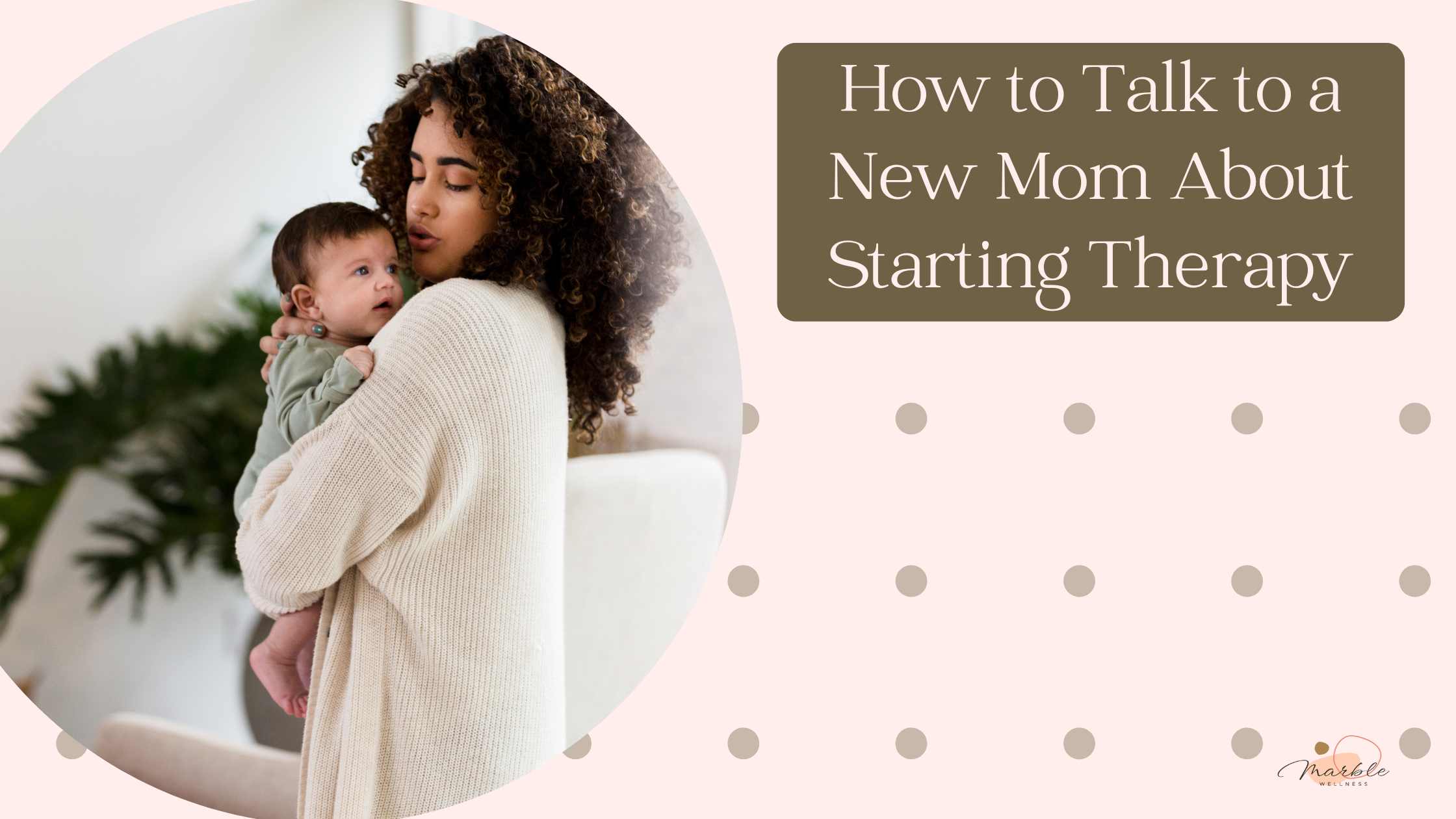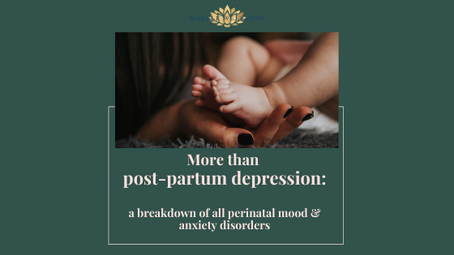Welcoming a new baby is a time of joy, but it’s also full of overwhelming emotions, endless responsibilities, and big life changes. For new moms, these challenges can sometimes feel too much to bear on their own, which is why offering support—particularly when it comes to mental health—can be a game-changer.
If you’ve noticed that a new mom in your life is struggling, suggesting therapy might be the best way you can help her navigate the emotional and psychological weight of this new chapter. However, it’s important to approach this conversation with care, sensitivity, and understanding. Here’s how you can bring up therapy for a new mom in a way that makes her feel supported, not judged. We even have a video at the end of this post you can share with momma
1. Pick the Right Time to Talk
Timing is everything when talking to a new mom about mental health. If you see her regularly, try to bring up the idea of therapy at a moment when she’s had a little time to herself—perhaps after she’s had a meal, or when the baby is asleep and she’s had a chance to breathe. Reducing distractions can help her feel more grounded and open to a thoughtful conversation.
2. Approach the Topic with Gentle Support
When suggesting therapy, keep the tone of your conversation gentle and non-judgmental. It’s important to frame the suggestion as a helpful option, not an urgent necessity unless you have significant concerns about her wellbeing. Many new moms may not recognize that they need help, especially when they’re buried under the chaos and fatigue of new motherhood. A gentle approach ensures that she feels heard, not criticized.
3. Acknowledge Her Experience
To make your suggestion feel more relatable and less like an imposition, acknowledge the challenges she’s facing. Reference specific things she’s shared with you, or symptoms you’ve noticed, to show that you’re attuned to her experience. For instance, you could say, “I’ve noticed you’ve been feeling more withdrawn lately and mentioned you’re unsure if things will get better. I think therapy could give you a safe space to talk about those feelings and get the support you deserve.” This helps her feel seen and understood, making the idea of therapy seem like a natural next step.
4. Educate Her About PMADs (Perinatal Mood & Anxiety Disorders)
It’s important to normalize the conversation around postpartum mental health. Many new moms may not realize that what they’re feeling is common, and could even be a symptom of Perinatal Mood and Anxiety Disorders (PMADs). These disorders go beyond just postpartum anxiety or postpartum depression; they can also include OCD, PTSD, perinatal bipolar disorder, and even psychosis. Letting her know that PMADs are a common, treatable issue can make therapy feel more accessible. For instance, you can share statistics like:
- 1 in 5 women experience a PMAD (and it could be even higher).
- PMADs aren’t just about depression—they can include a variety of mental health issues, from anxiety to PTSD.
- PMADs can affect partners too—postpartum mental health challenges aren’t exclusive to moms.
Knowing that other women (and even partners) face similar struggles may help her feel less isolated and more open to seeking help.
5. Explain How Therapy Can Help
Therapy can be a powerful tool in a new mom’s emotional toolbox. Here are some of the benefits therapy can offer:
- New coping skills to manage difficult moments. (Read our postpartum coping skills guide here)
- Education about postpartum hormones and mental health, which helps normalize what she’s going through.
- A space for herself, free from the demands of motherhood.
- Practical ideas for changing routines or environments that could reduce stress.
- A safe space to explore her emotions, fears, and challenges in adjusting to life with a new baby.
- Support for relationship challenges, whether it’s with a partner or family members.
- Strategies for emotional regulation and developing healthier thought patterns.
Let her know that therapy isn’t a one-size-fits-all solution, but a place where she can explore many aspects of herself—free of judgment and with the goal of improving her mental health.
6. Prepare for Potential Hesitations
It’s natural for new moms to have concerns about starting therapy. Be ready to respond to some common pushbacks with empathy and understanding:
- “I don’t have time.”
- “I know time feels scarce right now. But with online therapy in Missouri, finding 50-60 minutes might be easier than it seems. Some therapists even allow babies in sessions, if that makes things easier for you.”
- “It’s too expensive.”
- “Therapy can feel like an investment. You might want to check with your insurance to see if it’s covered, or look into sliding-scale fees or nonprofit services available in your area.”
- “I’ve tried therapy before, and it didn’t work.”
- “I totally understand. Not every therapist is the right fit. This time, let’s find someone who might be a better match for you. Many therapists offer free consultations or videos so you can get a feel for them before booking.”
- “I’d feel weird talking about this.”
- “That’s completely understandable. Most people feel awkward at first, but many say, ‘I wish I’d started sooner.’ Therapists are trained to help people feel comfortable, and they’ll make sure the experience is supportive.”
7. Offer to Bring It Up Again
If she’s not open to therapy at the moment, that’s okay. Let her know you’re available to talk about it again whenever she’s ready. Gently revisiting the topic after some time has passed can help her feel supported without feeling pressured.
A Little Encouragement Can Go a Long Way, Especially for a New Mom
Bringing up therapy to a new mom can feel daunting, but your gentle support could have a profound impact. Just knowing that someone sees her struggle and believes she deserves to feel better can be the first step toward getting the help she needs. Whether or not she chooses to pursue therapy right away, your encouragement and understanding can help her feel less alone in this difficult journey. Sometimes, all it takes is one person to say, “I see you, and I’m here for you”—and that can be the spark that helps a new mom get the support she truly deserves.
Start Maternal Mental Health Therapy in St. Louis
Therapy gives moms the chance to reclaim their experience of motherhood, so they no longer feel overwhelmed, depressed, or unheard. With support from a maternal mental health therapist, moms can learn how to thrive in their roles and build a balanced, fulfilling life.
Contact Us!
Learn About Our Group Offerings

Additional Counseling Services at Marble Wellness in St. Louis, MO
Our counseling services are designed to help set you on a path of living a more fulfilled, calm, and happy life. Our incredible team of STL based therapists has a variety of training backgrounds and areas of expertise. We specialize in anxiety, depression, grief, chronic illness, therapy for men, couples, and maternal overwhelm. Our practice also helps new moms with various postpartum concerns, moms in the thick of parenting, and moms with teens. We can also chat from wherever you are in the state with online therapy in Missouri. No matter where you are in your mental health journey, we would love to support you.



